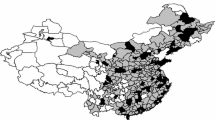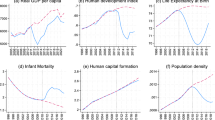Abstract
Much work in economic history has been done to study patterns of development in the USA and Europe. However, insights from other areas and regions are also required to better inform policy today that helps elucidate how policy interacts with the broader historical and institutional context and how the effects of these policies unfold over time. In this light, the paper focuses on illustrations from previous works of the author on extractive colonial institutions and their persistent effects on development paths later on. The first example is of the Peruvian mining mita. Here, the natives of Peru were forced by the Spanish to work in silver mines. The study focusses on the persistence of differential land tenures and public goods provision. The second example, a joint work with Ben Olken, considers Java's cultivation system in the 19th century, where the Javanese were forced to produce sugar that was sold in the world market by the Dutch. It shows that the sugar factory areas of the 19th century are more industrialized today. They are richer with better infrastructure and education levels as compared to the nearby counterfactual locations.

Source: Dell, M. (2010)

Source: Dell, M. (2010)

Source: Dell, M. (2010)

Source: Dell, M. (2010)

Source: Dell, M. (2010)

Source: Dell, M. (2010)

Source: Dell, M. (2010)

Source: Dell, M. (2010)

Source: Dell, M. (2010)

Source: Dell, M., & Olken, B. A. (2019)

Source: Commissie Umbgrove (1858)

Source: Dell, M., & Olken, B. A. (2019)

Source: Dell, M., & Olken, B. A. (2019)

Source: Dell, M., & Olken, B. A. (2019)

Source: Dell, M., & Olken, B. A. (2019)

Source: Dell, M., & Olken, B. A. (2019)

Source: Dell, M., & Olken, B. A. (2019)

Source: Dell, M., & Olken, B. A. (2019)

Source: Dell, M., & Olken, B. A. (2019)

Source: Dell, M., & Olken, B. A. (2019)

Source: Dell, M., & Olken, B. A. (2019)

Source: Dell, M., & Olken, B. A. (2019)
Similar content being viewed by others
References
Acemoglu, D., Johnson, S., & Robinson, J. A. (2001). The colonial origins of comparative development: An empirical investigation. American Economic Review, 91(5), 1369–1401.
Bakewell, P. J. (1984). Miners of the Red Mountain: Indian Labor in Potosí, 1545–1650. University of New Mexico Press.
Bleakley, H., & Ferrie, J. (2016). Shocking behavior: Random wealth in antebellum Georgia and human capital across generations. The Quarterly Journal of Economics, 131(3), 1455–1495.
Brisseau, J. (1981). Le Cuzco dans sa Région: Étude de l'aire d'influence d'une ville andine. Inst. Français d'Etudes Andines.
Cole, J. A. (1985). The Potosi mita, 1573–1700: Compulsory Indian Labor in the Andes. Stanford University Press.
Commissie Umbgrove. (1858). Archief van de Commissie voor de Opname van de Verschillende Suiker- fabrieken op Java [1853–1858]. Nationaal Archief, The Hague, Access Number 2.10.11.
Dell, M. (2010). The persistent effects of Peru’s mining mita. Econometrica, 78(6), 1863–1903.
Dell, M., & Olken, B. A. (2019). The development effects of the extractive colonial economy: The Dutch Cultivation System in Java. The Review of Economic Studies, 87(1), 164–203.
Donaldson, D. (2010). Railroads of the Raj: Estimating the Impact of Transportation Infrastructure (No. w16487). National Bureau of Economic Research.
Elson. (1994). Village Java under the Cultivation System, 1830–1870. Asian Studies Association of Australia.
Garrett, D. T. (2005). Shadows of empire: the Indian nobility of Cusco, 1750–1825 (Vol. 90). Cambridge University Press.
Glave, L. M., & Remy, M. I. (1978). Estructura Agraria e historia rural cuzquena: a proposito de las haciendas del Valle Sagrado: 1780–1930. Cuzco, Archivo Historico del Cuzco.
Hirschman, A. O. (1960). The Strategy of Economic Development. Yale University Press.
Krugman, P. (1994). The fall and rise of development economics. http://web.mit.edu/krugman/www/dishpan.html.
Larson, B. (1988). Colonialism and agrarian transformation in Bolivia. Cochabamba, 1550–1900.
Lowes, S., & Montero, E. (2016). Blood rubber: the effects of labor coercion on institutions and culture in the drc. Working Paper.
Luiten van Zanden, J. (2010). Colonial state formation and patterns of economic development in Java, 1800–1913. Economic History of Developing Regions, 25(2), 155–176.
Myrdal, G. (1957). Economic theory and under-developed regions. London: G. Duckworth.
Rasmussen, P. N. (1956). Studies in Inter-Sectoral Relations, E. Harck.
Salop, S. C. (1979). Monopolistic competition with outside goods. The Bell Journal of Economics, 10, 141–156.
Solow, R. (1997). How did economics get that way and what way did it get? Daedalus, 126(1), 39–58. http://www.jstor.org/stable/20027408. Retrieved 15 Jul 2021.
Tandeter, E. (1993). Coercion and Market. Silver Mining in Colonial Potosí, 1692–1826.
Author information
Authors and Affiliations
Corresponding author
Ethics declarations
Conflict of interest
The author has no known conflicts of interest.
Additional information
Publisher's Note
Springer Nature remains neutral with regard to jurisdictional claims in published maps and institutional affiliations.
Indian Economic Review public lecture, delivered on June 10, 2021 by Melissa Dell, Professor of Economics, Harvard University and John Bates Clark Medal, 2020 awardee.
Rights and permissions
About this article
Cite this article
Dell, M. Persistence and transformation in economic development. Ind. Econ. Rev. 56, 285–311 (2021). https://doi.org/10.1007/s41775-021-00122-9
Accepted:
Published:
Issue Date:
DOI: https://doi.org/10.1007/s41775-021-00122-9




